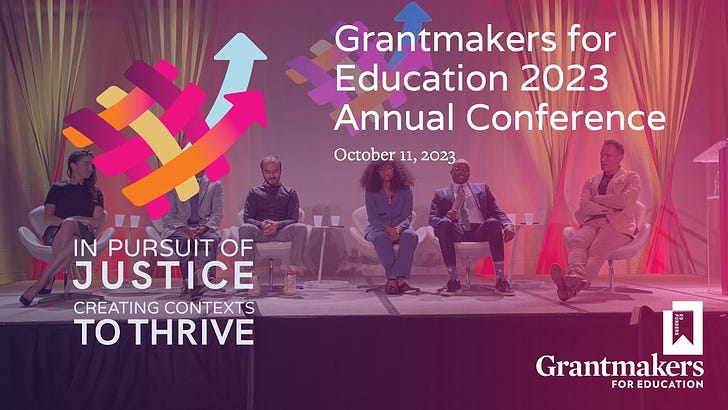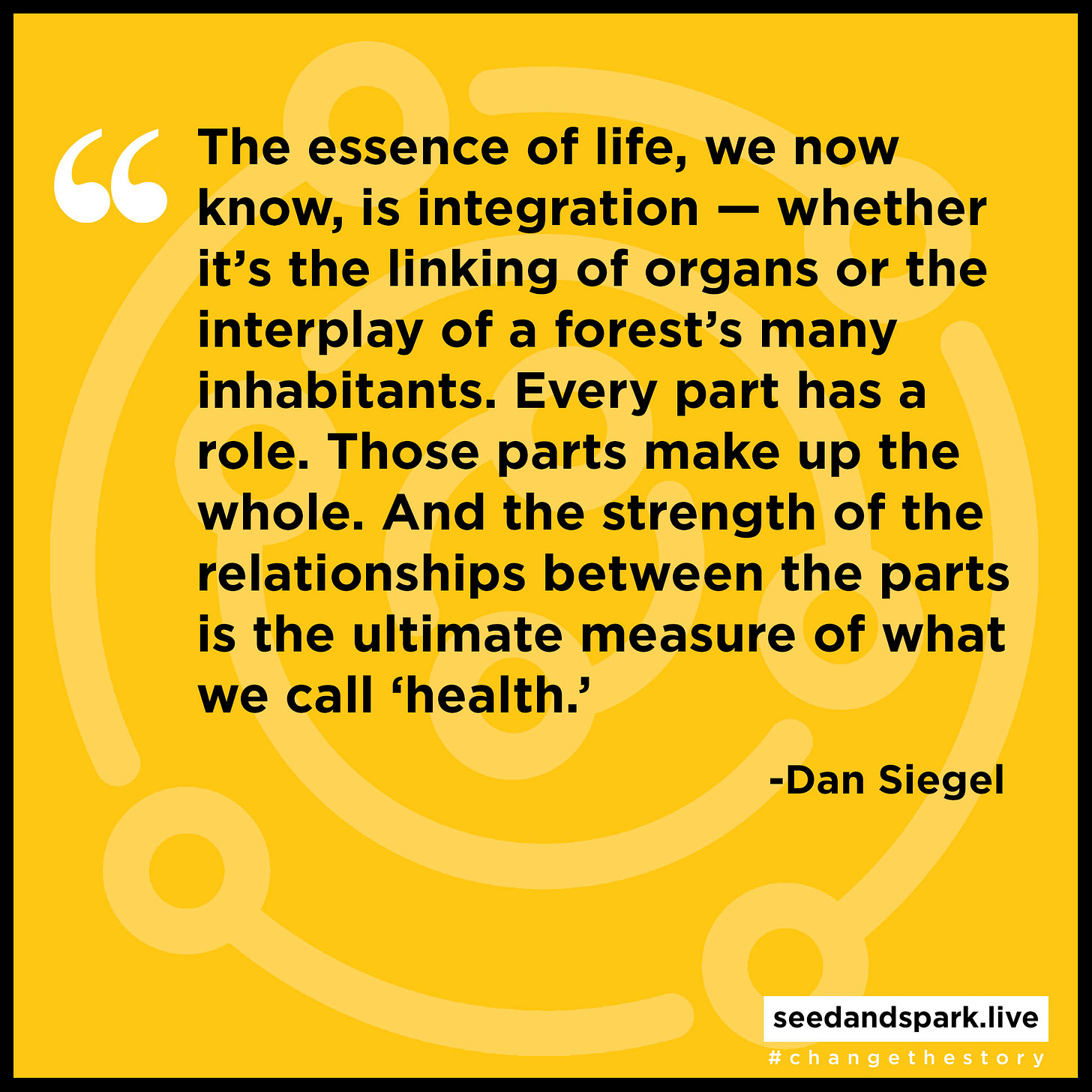The Ten Commandments for Ed Funders
I.e., Do's and Dont's for the future of philanthropy -- in service of the future of learning
This morning, I had the honor of speaking to a roomful of the country’s top educational philanthropies at this year’s Grantmakers for Education conference, and facilitating a panel discussion with some of the field’s leading thinkers about what they think funders need to start, stop and keep doing when it comes to the future of learning -- and its relationship to the future of humanity.
In particular, we were thinking about the role of technology, and the ways innovations like ChatGPT have, in less than a year, completely disrupted the way we think about education, work, and what it means to be prepared in the 21st century.
The painful truth is most panels leave no lasting memory or insight with the audiences that are subjected to their ramblings. So to flip the script, I asked our panel to actively construct a set of commandments for the audience -- specific pieces of advice, grounded in the panelists’ wisdom and experience as policy wonks, researchers, students and practitioners -- that the funders in the room could use to guide their future strategic decisions, in ways that kept their eyes squarely on the ultimate prize.
Fittingly, they came up with ten. Here they are -- so see what you think, and tell me what else you would add (or revise) in the comments below.
1. SUPPORT “STRETCH” EXPERIENCES
On this point the research is clear: people don’t learn best when they’re comfortable, or when they’re in danger. They learn best when they’re supportively stretched to take risks. So funders should prioritize creating more stretch experience for young people like the youth apprenticeship model -- Career-Ready ATL -- that our student panelist Rachel McBride says helped change the trajectory of her life.
2. MAKE RELATIONSHIPS AN OUTCOME, NOT JUST AN INPUT
Too often, relationships are seen as a nice-to-have aspect of a larger reform strategy. Instead, they need to be seen as a must-to-have outcome that is worthy and vital in and of itself. This is a foundational part of the MET, which doesn’t even define itself as a school, but as an “advisory and internship program.”
More of this, please.
3. USE TECHNOLOGY AS AN ASSET, NOT AN ALL-ENCOMPASSING END
There’s no point trying to put the genie back in the bottle; ChatGPT will only get better and more useful. But there’s a big difference between defining a particular technology as the all-encompassing solution to our problems, and seeing it as an asset that can be part of a larger and more integrated effort to help kids discover who they are and what they want to do with their one precious life. This is worth remembering.
4. GIVE THE POWER TO THE PEOPLE
People only support what they create.
I repeat -- PEOPLE ONLY SUPPORT WHAT THEY CREATE.
So if you’re considering an investment in which the innovation unfolds at a distance from the people it seeks to support, buyer beware.
5. GET OUT THERE
There are so many amazing schools out there, and visiting them and bearing direct witness to the magic they have harnessed is incredibly valuable. So is experimenting with all these new technologies -- from ChatGPT to MidJouney to Dall-E to Perplexity.
So get out there.
Visit some places.
Play with some stuff.
And see what becomes clear to you as a result.
6. EXPAND THE WE
It’s well-established that a lot of these tech tools, and even the depictions of the tools themselves, have been filtered through a lens that has distorted our society for generations (read: Male, Yale & Pale). As a result, every investment we make, and every effort we join, should be explicitly concerned with undoing those harms, and deepening our ability to live with our deepest differences in ways that are in service of our diversity -- instead of at the expense of it.
7. WIDEN YOUR APERTURE -- AND MAKE SURE IT STAYS OPEN
Education reformers love to fall in love with shiny new things, from test-based accountability to standards-based reform. Yet the moment our aperture begins to narrow, we start to miss the forest for the trees.
Instead, we need to widen our aperture -- and recognize that in order for true transformation to occur, the future itself must become more trans: transcultural, transdisciplinary, and maybe even, if we can keep our aperture wide enough, transcendent.
8. LITERACY > FLUENCY
Traditionally, the way we’ve prepared people for professional work was by front-loading their expertise. Increasingly, though, many (most?) of our jobs will be taken over by smart machines, allowing new roles to arise -- at a faster rate than anyone can master. So we need to start shifting away from content fluencies, and towards omnidisciplinary content literacies -- alongside a fluency in the most fundamental skills and dispositions of our humanness.
9. AUTHENTIC > ARTIFICIAL
If a kid has to ask why they’re learning something, it’s probably because the learning itself is fake. And while that was never a good idea, it’s an especially egregious one now, when we know enough to create learning opportunities that are socially relevant, socially embedded, and socially experienced.
All learning, everywhere, at all times, should be authentic and relational -- not artificial and abstract.
10. USE TECH TO LOOK BACKWARDS — AND PEOPLE TO LOOK FORWARDS
And finally, as cool as they are, tools like ChatGPT are little more than mirrors reflecting back at us the totality of human wisdom and thought on the Internet. This is why they’ve shown an early proclivity for racism and anti-semitism.
We have met the enemy, after all -- and it is us.
By design, then, AGI tools allow us to look backwards; only other people can help us look forwards.
So if what you seek is an understanding of how we got here, then by all means, fire up the large language model.
But if what you seek is a sense of where we need to go from here, then fellow physicians, there is only one way forward: we must heal (and lead) ourselves.





Grateful for this inside scoop and for the script flip. Especially love #s 2 & 5. Thank you for being part of and sharing this conversation.
I’ve been feeling #5 a lot - wondering about the last time many of us have set foot in a classroom (besides our child’s), actually listened to a teacher or student share their daily experiences - and our proclivity to have opinions about how things ought to be without really feeling and understanding how they are.
Yes, definitely, to all 10, but particularly the first 4. Relationships are key at all stages and all levels of learning. Technology is a tool as well as an asset. Philanthropists and social entreprneurs need to realize that improving education - formal (mass) learning - is just hard work and takes lots of time. The latest shiny thing and quick results are not related to reality. It's all about people.